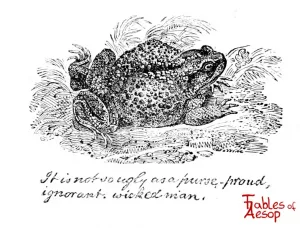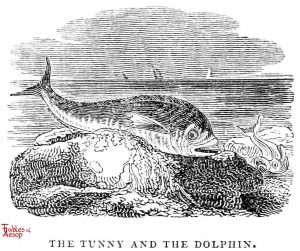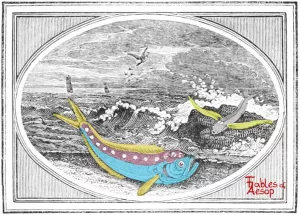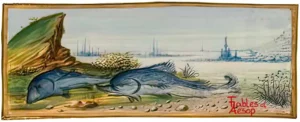A Thunny and dolphin wash ashore. The Thunny was pleased to see the dolphin die first.
There is satisfaction in taking one’s enemy along if one has to die.

JBR Collection
A Thunny being pursued by a Dolphin, swam for safety into shallow water. Seeing the Dolphin still after him, he came further in shore, and was thrown by the waves high and dry on the sand. The Dolphin, eager in pursuit, and unable to stop himself, was also stranded. The Thunny beholding the Dolphin in the same condition as himself, said, “Now I die with pleasure, for I see my persecutor involved in the same fate .”

Samuel Croxall
A FISH called a Thunny, being pursued by a Dolphin, and driven with great violence, not minding, which way he went, was thrown by the force of the waves upon a rock, and left there. His death was now inevitable: but, casting his eyes on one side, and seeing the Dolphin in the same condition, lie gapping by him, Well, says he, I must die, it is true; but 1 do with pleasure, when I behold him who is the cause if it, involved in the same fate.
THE APPLICATION
Revenge, though a blind, mischievous passion, is yet a very sweet thing: so sweet, that it can even sooth the pangs, and reconcile us to the bitterness of death. And, indeed, it must be a temper highly philosophical, that could be driven out of life, by any tyrannical, unjust procedure, and not be touched with a sense of pleasure to see the author of it splitting upon the same rock. When this is allowed, and it is farther considered how easily the revenge of the meanest person may be executed upon even the highest, it should, methinks, keep people upon their guard, and prevail with them not to persecute or be injurious to any one. The moral turpitude of doing wrong is sufficient to influence every brave honest man, and to secure him from harbouring even the least thought of it in his breast. But the knave and coward should weigh the present argument, and before they attempt the least injury, be assured of this truth, that nothing is more sweet, nor scarce any thing so easy to compass as revenge.

Thomas Bewick (The Flying Fish and The Dolphin)
The Flying Fish, to avoid its enemies, leaves the water, takes wing, and mounts up into the air. The Dolphin is one of the most constant of these enemies; and its velocity through the liquid element, it is said, surpasses that of every living creature, insomuch that as it darts along, the brilliancy and changeableness of its colours, which cannot be described, appear like the flash of a meteor. A Flying Fish being pursued by a Dolphin, in his eagerness to escape, took too long a flight, and his wings becoming dry, he fell upon a rock, where his death was inevitable. The Dolphin, in the keenness of his pursuit, ran himself on shore at the foot of the rock, and was left by the wave, gasping in the same condition as the other. Well, says the Flying Fish, I must die it is certain; but it is some consolation to behold my merciless enemy involved in the same fate.
APPLICATION.
When brought low by a cruel and insolent oppressor, there is no torture we feel more poignantly, than to see him triumphantly exulting in our downfal; and the opposite extreme must take place in our minds, on seeing our enemy over-shoot his mark, and in his turn brought down to the same level of distress with ourselves. The temper that is not touched with feelings of this kind, must be of a highly philosophical cast indeed. The great and powerful, for the sake of their own peace of mind, should not unfeelingly persecute their inferiors; for nothing is more sweet to some tempers, and scarcely any thing more easy to compass, than revenge.


L’Estrange version
A thunny gave chace to a dolphin; and when he was just ready to seize him, the thunny struck before he was aware, and the dolphin, in the eagerness of his pursuit, ran himself a ground with him. They were both lost; but the thunny kept his eye still upon the dolphin, and observing him when he was just at last gasp: Well, says he, the thought of death is now easy to me, so long as I see my enemy go for company.
Moral
‘Tis a wretched satisfaction, that a revengeful man takes, even in the losing of his own life, provided that his enemy may go for company.

Gherardo Image from 1480

Delphinus et Pisciculus
Persequebatur pisciculum delphinus. Hunc ut vitaret, pisciculus ad rupem confugit. Quem ut captaret, delphinus tam violento sequebatur impetu ut arenis illideret et, haerens, morti succumberet. Quod cum vidisset pisciculus, sibi paululum consolatus est, moribundulus, inquiens, “Dulcior mihi profecto mea mors futura est, quod prius auctorem meae mortis defunctum prae oculis viderim.”
Perry #113



